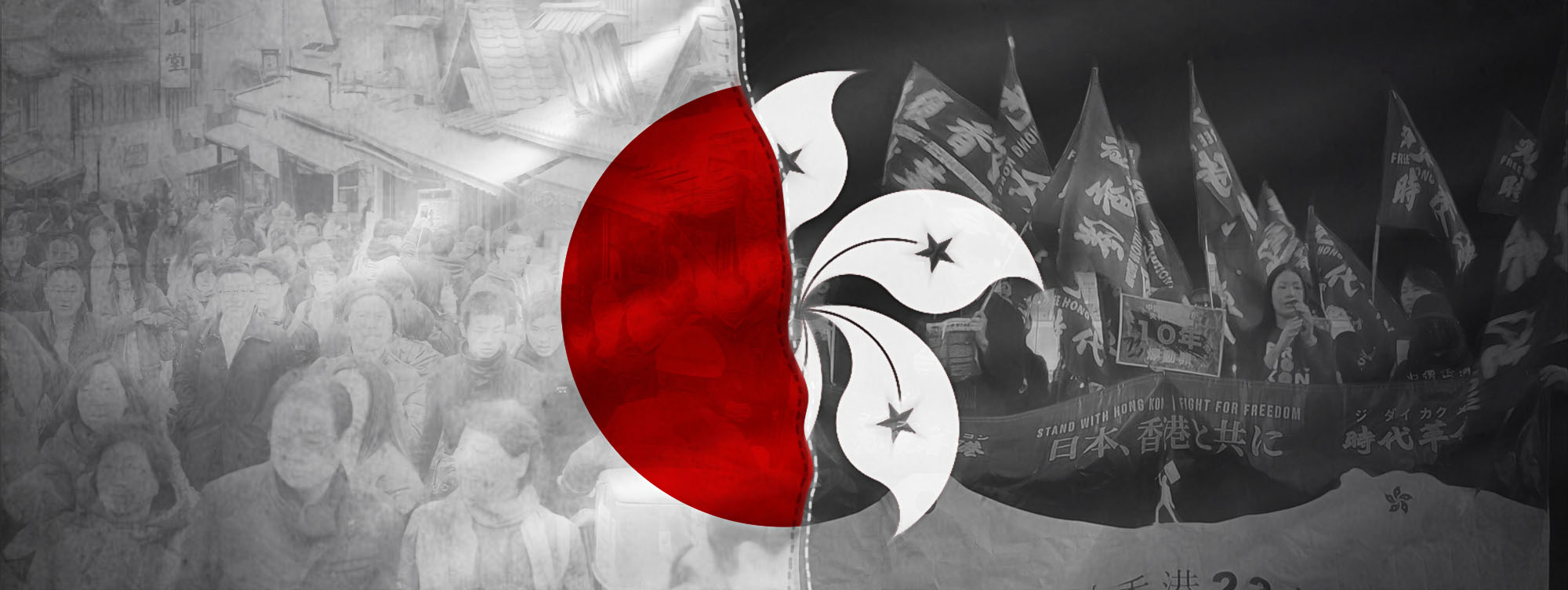|
Getting your Trinity Audio player ready...
|
When Hong Kong’s latest national security law came into force recently, Japan lost no time issuing an official statement reiterating its “grave concern” that the move would “further undermine the confidence in the ‘One Country, Two Systems’ framework.”
Four years before, Tokyo had also released something similar regarding an earlier national security law, which Hong Kong’s legislature had passed that June. More than 120 parliamentarians signed that official statement.
Gen Nakatani, who until recently was the government’s human rights adviser to the Prime Minister and who has served as Japan’s defense minister in previous administrations, also led a group of politicians in 2020 pressing for sanctions against China, as well as other organizations and individuals that had committed human rights abuses. The government rejected the request, but there was no doubt about Tokyo’s stance on Hong Kong.
Japan is currently the chair of the Group of Seven (G7) comprising the world’s most advanced economies that are committed to democracy. According to the Foreign Ministry website, Japan champions human rights diplomacy through “dialogue and cooperation.”
Yet Patrick Poon, a visiting researcher at the University of Tokyo, echoes other Hong Kong activists in saying, “The road to achieve a free Hong Kong often appears lonely and long in Tokyo.”
He adds: “Japan is a peaceful society facing no threats to its freedom of expression. As a result, while there is sympathy for activists, the general attitude is that problems in Hong Kong are separate from Japan.”
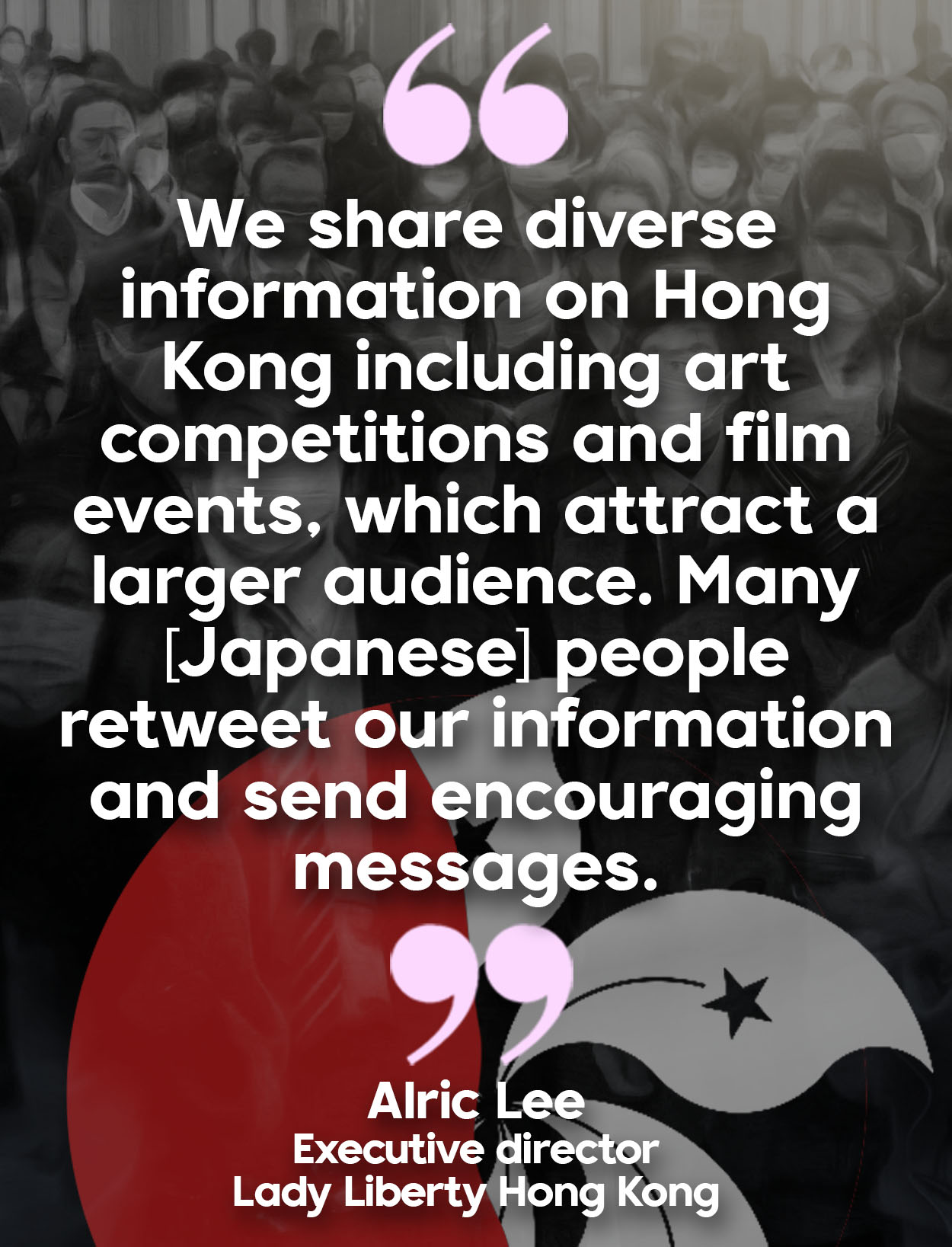 Indeed, for years now Hong Kong activists have been holding demonstrations in Japan over Beijing’s ever-tightening grip on their city, and they have noticed that few locals now join these protests. The activists – many of them, like Poon, living temporarily in Japan for work or studies – also say that sustaining local interest in Hong Kong political developments has been hard.
Indeed, for years now Hong Kong activists have been holding demonstrations in Japan over Beijing’s ever-tightening grip on their city, and they have noticed that few locals now join these protests. The activists – many of them, like Poon, living temporarily in Japan for work or studies – also say that sustaining local interest in Hong Kong political developments has been hard.
Poon says that they work mostly in isolation and are in constant need of “loads of patience.” This has led him and other Hong Kong activists in Japan to try another avenue to raise awareness about what is happening in their home city: social media.
Alric Lee, executive director of Lady Liberty Hong Kong, started the campaign that he describes as “more appropriate” for Japan.
“We share diverse information on Hong Kong including art competitions and film events, which attract a larger audience,” says Lee, who arrived in Japan in 2015 and is still pursuing postgraduate studies in architecture at the prestigious University of Tokyo. “Many people retweet our information and send encouraging messages.”
The ‘Agnes Chow factor’
For sure, it had been through social media that many Japanese had first stumbled upon Agnes Chow, 27, one of the high-profile faces of Hong Kong’s pro-democracy movement.
At one point Chow, who is fluent in Japanese, had as much as half a million Japanese followers on Twitter (now X). She visited Japan in 2019 and later won herself legions of more Japanese fans after revealing that she loved manga and sang Japanese songs during the seven months she spent behind bars for being part of Hong Kong’s 2019 pro-democracy protests.
Now studying in Canada, Chow was recently put on the wanted list by Hong Kong authorities.
“Her celebrity status in Japan is the key behind Japanese support for activists,” Poon says. “But when it comes to consistency, there is a problem.” He adds that interest among the Japanese about Hong Kong plummeted following Chow’s recent decision to take a break from activism due to mental health issues.
“Having a popular figure such as Agnes has been the key to gain support in Japan,” Lee says. “But it is a challenge to promote the story behind (Chow’s own saga). An apt way forward to maintain Chow’s momentum is to educate the public without a confrontational stance.”
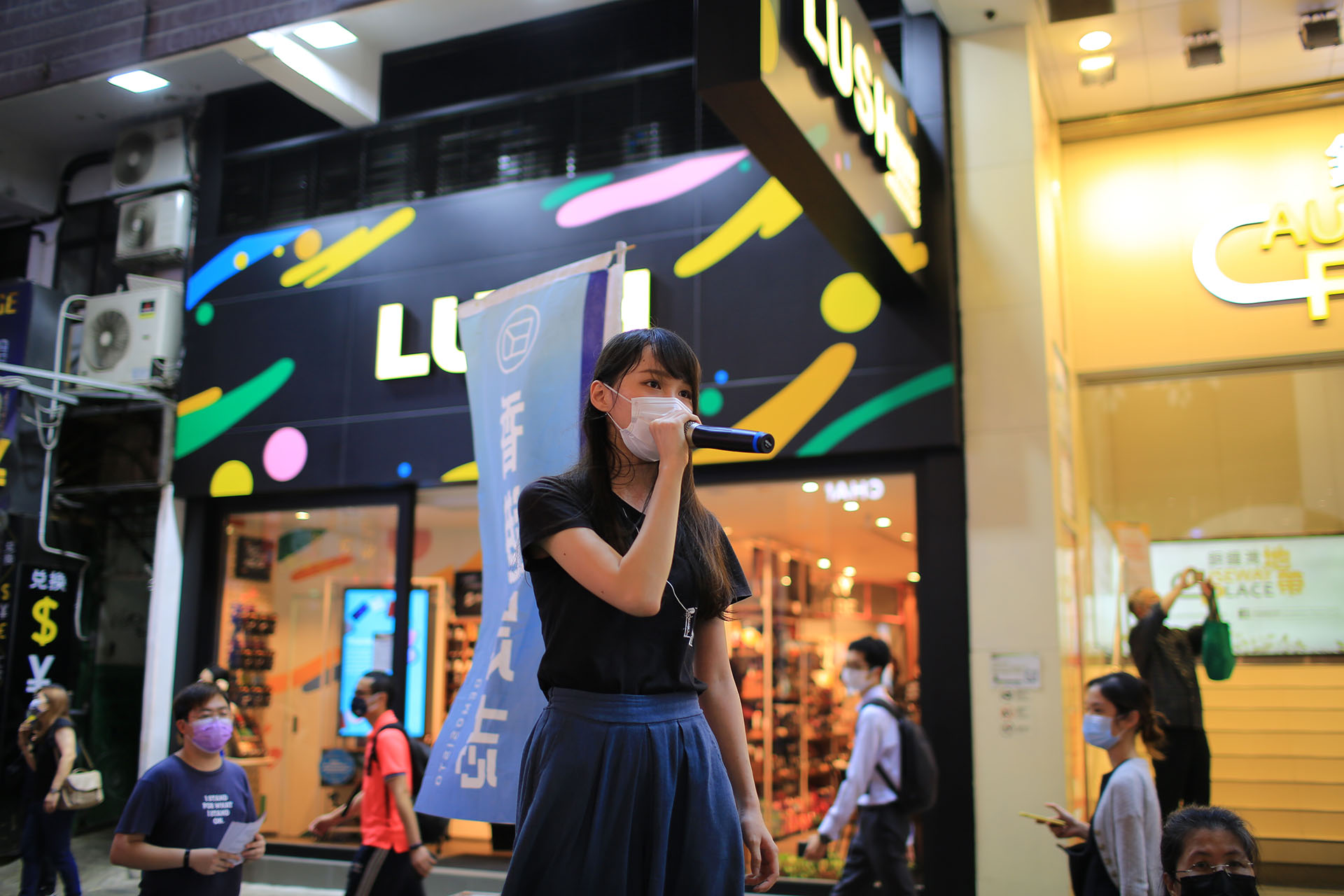
Hitotsubashi University professor and human rights expert Maiko Ichihara says that the strategy chosen by the Hong Kong activists is “a suitable style of communication” in Japan. “While protests draw attention of both the traditional and social media given its massive outreach, quiet in-personal conversation tends to be more effective to the wider goal of drawing personal sympathy to the cause.”
Ichihara recounts that in the 1970s, Japanese society had been shaken by violent protests as university students and leftist movements fought bitterly against the government over the Japan-U.S. Security Treaty of 1960, as well as over the Vietnam War. But she says these kinds of protests are no longer popular. “Japanese people today are too engrossed with a busy workload to support civic change,” Ichihara says.
Japan’s aging population and how the younger generation has been brought up may also have something to do with the seeming disinterest among the Japanese in political and civic activities. The youth, after all, are usually at the forefront of political activism. However, they are now outnumbered by people 65 years old and above in 41 administrative entities across the nation, according to the government.
Meanwhile, a 2021 Washington Post article on the low interest in voting among Japanese youth noted that talking about politics remains a social taboo in Japan. For decades, Japan’s Public Offices Election Law banned student participation in politics.
The Hong Kong activists themselves are unable to count on fellow Hong Kongers in Japan to show up for many of their pro-democracy activities. While there may be as many as 30,000 Hong Kongers in Japan today, they are scattered across the country.
The long arm of Beijing has also become a potent deterrent for some of those who still want to return to Hong Kong or the mainland. Just last November, a Hong Kong court handed a two-month jail sentence to a 23-year-old Hong Kong woman for her allegedly seditious posts on Instagram and Facebook – most of which she had made while studying in Japan.
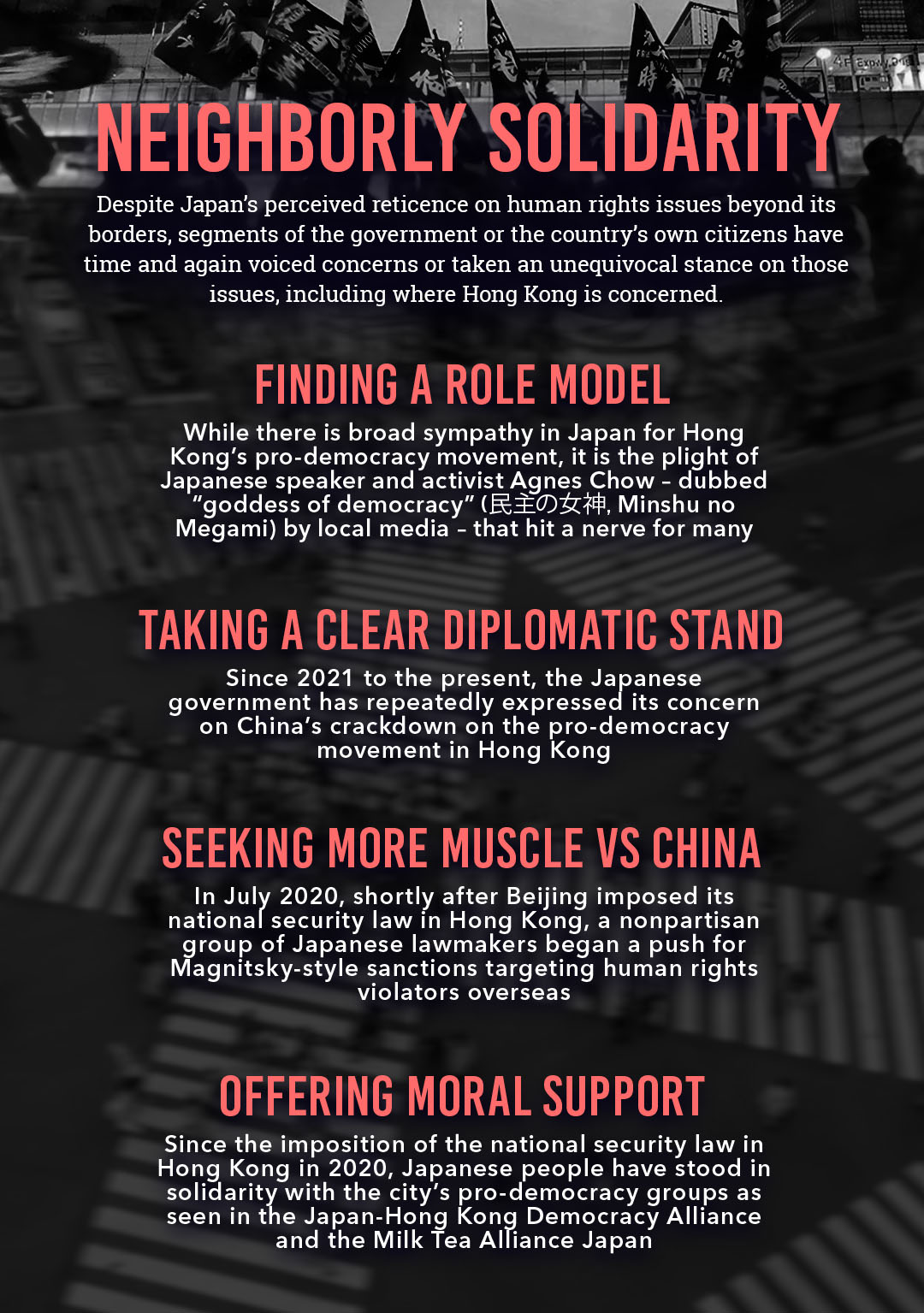
Looming regional threat
And yet the threat China poses to regional security has triggered some of the most significant protests in Japan. In 2015, for instance, lawmakers’ attempts to override provisions in the country’s pacifist constitution in the midst of China’s growing strength was met with massive protests all over Japan.
Last October, dozens of Japanese activists gathered in Tokyo to protest the government’s fortification of the Ryukyu Islands in response to the continuing Chinese threat in the region.
According to Japan Times, there were also some Japanese among the demonstrators who showed up in Tokyo in the same month last year to mark the 74th anniversary of the founding of the People’s Republic of China with a protest against Beijing’s “repression, genocide and expansionist policies, which have fueled regional tensions since communist China’s inception.”
Even the Japanese media have spoken up on why it is important for Tokyo to protest against what has been happening in Hong Kong. In a June 2023 editorial that listed the rights “stripped” from Hong Kong citizens since the implementation of Beijing’s 2020 national security law, Asahi Shimbun cited the case of “a Japanese citizen who supported protests in Hong Kong was denied entry into the region.”
“There are legitimate concerns that Japanese nationals could also be targeted in the crackdown,” the newspaper said. “Hong Kong has historically served as a window connecting China with the outside world and the flow of people, goods and information that move through it have brought prosperity to both China and the rest of the world,” it argued. “It should not be allowed to become an outlet to discharge the evils of authoritarianism into the world. Japan should keep protesting China’s suppression of human rights in Hong Kong without treating it as somebody else’s problem.”
But Ichihara says that Japan’s official position on Hong Kong already stands out in Asia, where most other governments have not expressed solidarity with the people of one of China’s Special Administrative Regions. She says of the attitude of other countries in the region: “There is a reluctance among Asian governments to upset China given its leading economic presence in their economies.”
Ichihara, however, concedes that the Japanese government’s official responses to democratic violations in other countries tend to be more tempered compared to those of Western nations. She also says that the erosion of Hong Kong democracy in particular “represents a diplomatic challenge to the Japanese government.”
“Tokyo is acutely aware of balancing bilateral ties with one of its foremost economic partners,” says the academic, who teaches democracy and diplomacy at Hitotsubashi University’s Graduate School of Law and the School of International and Public Policy, which is a leading platform supporting human rights in Asia.
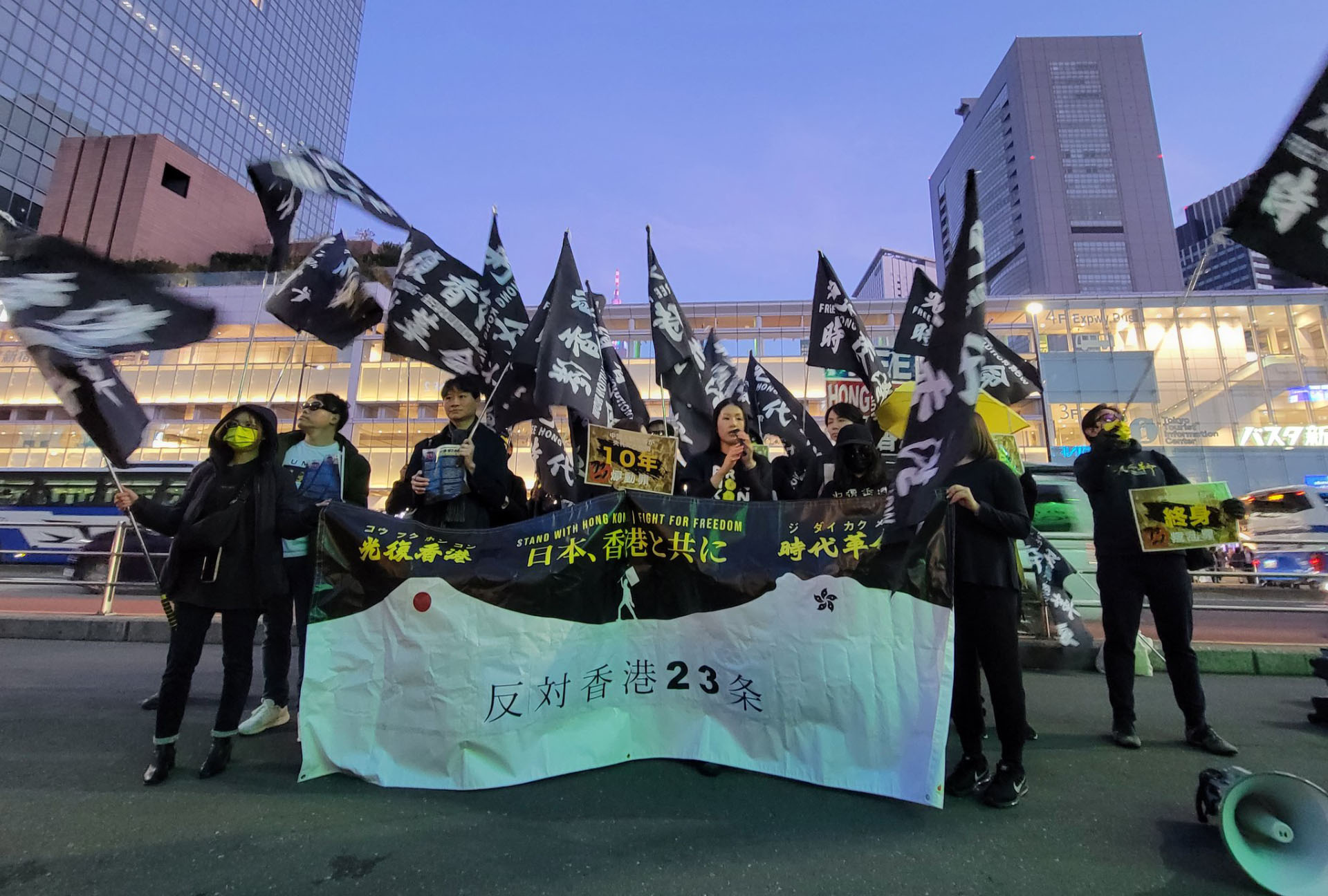
Last year, she initiated the formation of Milk Tea Alliance Japan. Launched last December at the Hitotsubashi University’s Institute for Global Governance Research, the Alliance is the Japanese branch of the network of pro-democracy activists across Asia that originally had members from Hong Kong, Thailand, and Myanmar.
Milk Tea Alliance Japan aims to strengthen solidarity among Asian democracy activists in Japan. Its pan-Asian big sibling meantime creates collective strategies to fight against authoritarian governments, largely by connecting Asian activists with members of civil society, as well as with legislators and journalists.
Poon says that activists end up learning valuable lessons in the search for collaboration with different groups. At the same time, he says, solidarity with other groups across the region greatly benefits the Hong Kong pro-democracy movement by sending a stronger message to the world.
“It is also a landmark for human rights activism,” he says. ◉










